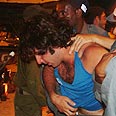
Only those with a highly selective memory can argue that closing the Gaza Strip is unprecedented. There are plenty of precedents, but almost all of them were meant to obstruct the actions of the opposing political camp.
Declaring Gaza a closed military zone to those who are not permanent residents there is a technique often applied to Palestinians and left-wing demonstrators. When closure orders were used against the latter, the apparent rationale was to maintain public order.
It was often not the demonstrators who caused the public disturbances, but rather those whom they had come to demonstrate against.

Soldiers and anti-pullout protester: Gaza 2005
But military leaders didn’t bother delving too deeply into who is responsible for the brawling. They simply deported those who wanted to exercise their rights to cry out against robbery, that same right now invoked by opponents of the disengagement.
The difference is that the left-wingers have not announced their intentions to use their bodies to obstruct the establishment of illegal settlements on occupied lands, nor will they destroy army equipment or prevent troops from helping known criminals, such as those whose deeds are described in detail in a Talia Sasson document.
Army favoritism backfires
Those who enjoyed decades of favoritism from the army should not be surprised when the government and the Knesset order the army to evacuate the settlements of Gaza and northern Samaria, nor when the army carries out those orders by means used to the best of its officers' judgment.
And the reasons are clear to anyone with eyes in their head. It’s one thing to remove a few thousand people, most of them moderate and restrained. It’s another thing to remove tens of thousands of people, many of whom are hotheaded extremists.
Allowing those kinds of people into the area of contention is a tried and true recipe for people to get hurt. As soon as the army discovered that more than 1,000 young agitators just itching for a fight had already made it in to the Gush Katif settlement bloc, they had to head the rest off by sealing its entrances early.
Gush Katif residents have only the Yesha Council and other even more extreme organizations to thank for the difficulties they will have from being ripped out of their homes.
The Council, whose logistical and tactical means are already largely funded by the government in a roundabout way, is about to declare an open rebellion. There’s no other way to describe the assembly of thousands of people whose goal is to infiltrate a closed military zone and to lay siege to Gaza’s entrances so as to prevent an action already decided upon by the government and the Knesset.
Refusing orders
The call by a few individual rabbis of the hesder yeshiva movement to its students to refuse to carry out the orders concerning the disengagement sounds very much like rebellion as well. Leaders of the “National Home” movement have even taken things a step further: They told their followers to disband the campsite where soldiers for the disengagement mission will be quartered.
What is the significance of these actions tendered, if not a guerilla war against the IDF?
Would it be such a wild exaggeration to predict that as a result of all of this burning hatred growing among the right-wing extremists someone might just go ahead and put down a small bomb, just a small one, a small one by the roadside, so as to deter soldiers, and nothing more than that?
The disengagement will come off on the date as planned, and not just because the army can ill afford to fail in its mission. If it fails, it is doomed to fall apart. Army officers are creating an atmosphere in which all heads of organizations faced with this type of mission do: They are widening the security cordon, they are stepping up their efforts and they are applying tougher sanctions against those who would try and sabotage the mission.
It’s worth listening to the chief of staff’s tone lately and not just the content of his words. The man whose appointment was initially shrouded in controversy has turned out to be the right one for these times.
















